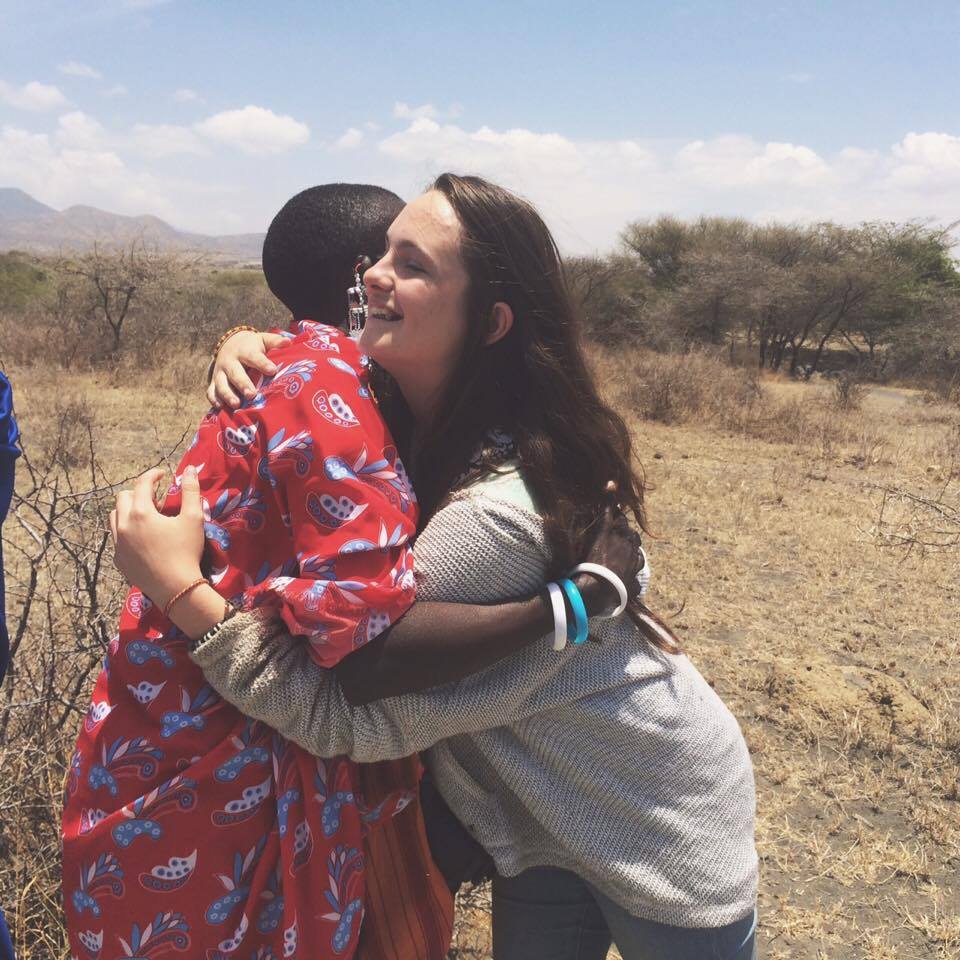I remember being six years old holding a small, disposable camera in my hands. I was the unofficial amateur photographer who would snap pictures of my friends, camp counsellors, and favourite places. This is the earliest memory of what has since become my life’s passion and work: visual storytelling.
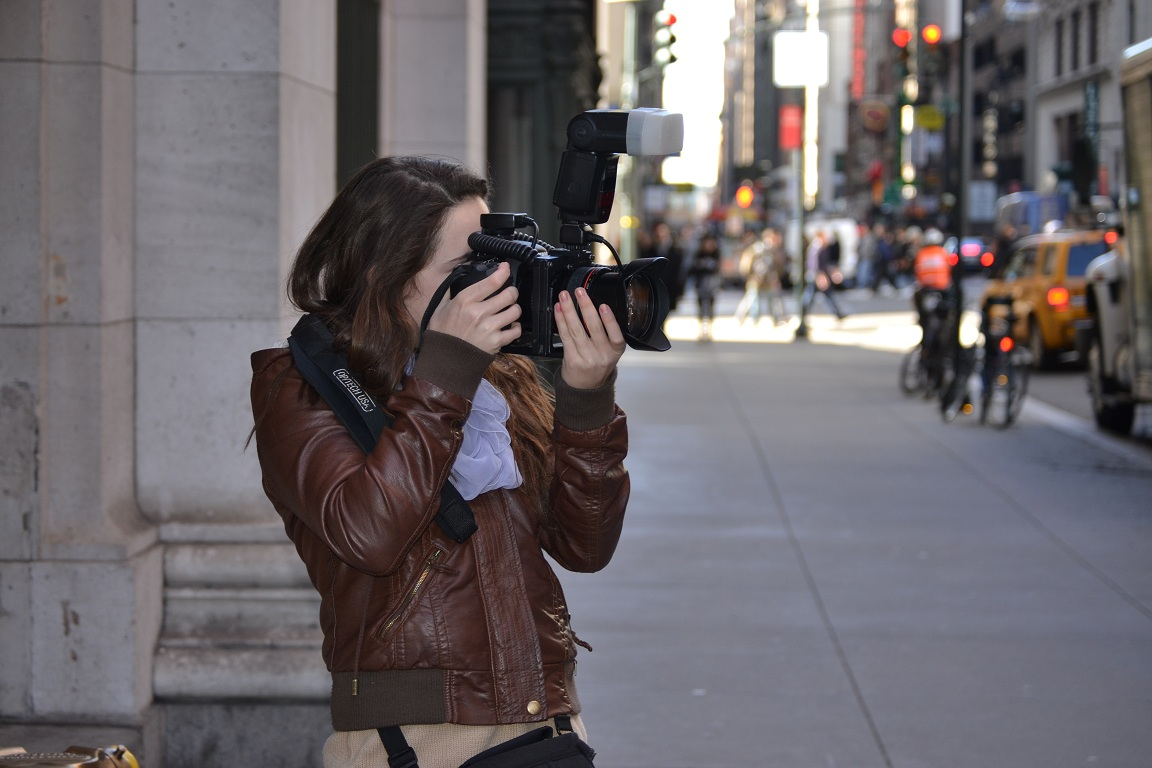
By the time I turned 14, this hobby of mine had turned into a full-fledged obsession. I couldn’t go anywhere without my camera which I purchased on my own from the sale of a line of body scrub I made. I was a social entrepreneur who loved photography and was simultaneously deepening my interest in social justice. Kasha’s cards of Kindness became the next product I created and 25% of the proceeds of these cards were donated back to local charities.

Before entering my first year of high school, I attended a youth leadership camp run by The Canadian Voice of Women For Peace. For over 20 years they sent delegates to New York City every March for a United Nations conference on gender equality (The Commission on the Status of Women), Both my mom and I were selected to go. I was part of their first youth delegation and the youngest member of the organization.
I could never have predicted how this first trip would change my life. 6,000 social justice advocates (both women and men) from civic societies around the world were in attendance. I met hundreds of incredibly intelligent and caring people who were working for social change in their own communities. They shared heart-wrenching stories with me about the issues and struggles they were facing and showed fierce determination in finding solutions to them. Their passion and dedication was motivating to me.

Once home, whenever I turned on the news, all I’d see were awful portrayals of the world we lived in. Countries everywhere seemed to be in a turbulent state. I felt a strange mix of fear, overwhelm, and numbness. It was too hard to watch. I couldn’t help but feel like the media was missing something. It was. It lacked the voices of these courageous and resilient global citizens I had met attending the conference.
This experience would soon become the catalyst for an even bigger dream and wake up call. I had two main passions in my life, but it wasn’t until I attended the UN that I thought to combine them. Film and photography would become the way I would begin to express my activism. It was one thing to hear these stories, but I knew I had to also see where the stories lived and share them with the world. My hope was that by doing so, people would be also be empowered to take action.
Not long after returning from the conference in New York, I worked up the nerve to ask my mom if I could take time off time from high school to travel and make a documentary film. This seemed like a crazy pitch, even to me (I had absolutely no experience in filmmaking at the time). I was picturing all the ways my mom would say no. For sure I thought she’d never let me take a year out of high school…but also, coming from a single-parent household, our resources were limited so my expectations were low. Her response took me by surprise. “If you can figure out where we’re going get the money to make that happen, I don’t see why not”. So, I learned everything I could about crowdsource funding. I spent a whole year fundraising through Indiegogo & hosting events, practicing my photography, training myself in filmmaking, writing, reaching out to potential in-kind sponsors, and building a community. Endless nights and weekends were spent at the computer, with mom as my number one volunteer, working to bring this dream to reality.
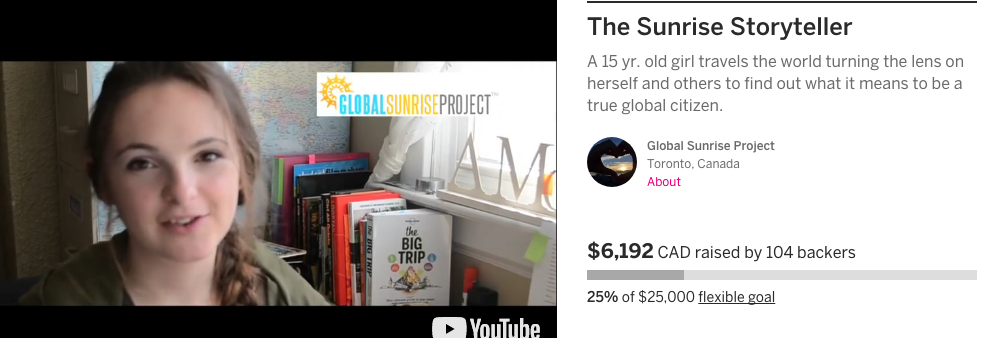
Photo: My first Indiegogo campaign video to raise funds for the trip.
https://www.indiegogo.com/projects/kasha-the-sunrise-storyteller#/
But, sometimes you need a sign from the universe to know you’re on the right track. About month away from our departure, I started to doubt myself as to whether or not it would happen.
I was preparing for a craft show to sell my cards and scrub and asked my mom if I could use a wooden magazine crate from the house as a display. I needed help moving it. With my mom’s help we moved the box off the shelf and found this old newspaper clipping underneath it which read:

There was no turning back. On my 16th birthday, after a year of planning and preparation for a trip we were unsure of how we were going to pull off, it was finally time to leave my home continent for 6 months. Thoughts raced through my mind as I sat in my window seat, aboard the plane that would take me to Africa. Never having traveled much and definitely not internationally, I had no clue what to expect. Mom and I hadn’t planned past our first destination, and I was worried if I’d be able to find people willing to share their stories with me.
I’ll never forget one of my interviews which took place in a drug-infested township (slum) on the outskirts of Cape Town, South Africa. I was introduced to 17 year old Micheala through a local fair-trade hostel called The Backpack supporting community programs. She had a striking radiant smile and positive energy despite the need for protection being offered by her gated school grounds. Micheala, who had lost both her parents at a very young age, described the reality of living in her community where there was a dangerous culture of drugs and gangsterism within the township. 10 of her friends (her age or younger) were already mothers and only 3 of them remained in school. She continued to explain how often while in class, she’d hear gunshots from over the fence into the schoolyard playground. Her life as a 17 year old teenage girl in South Africa contrasted dramatically to the life I was familiar with in Toronto, Canada and yet we shared many similar interests.
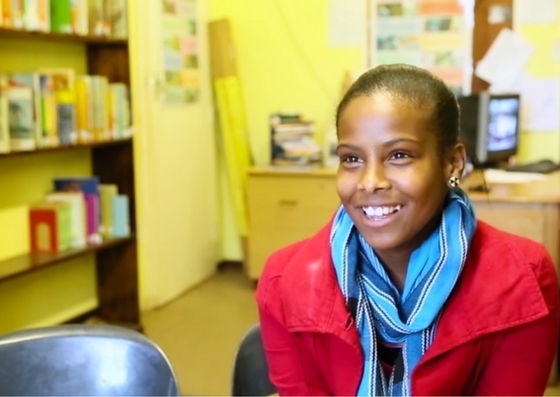
Photo: Micheala, age 17 during our interview.
Despite the challenges she faced, I remember being most impressed by her determined efforts not to take the same path her as some of her peers. She explained to me how she would “choose not to indulge into what everyone else is doing.” Her focus was on her studies, her jump-rope competitions and mentoring other students. This seemed like such a normal choice, but in this community, was an extremely brave and rare one too. Micheala challenged the status quo to be a leader and role model for her friends. Her community involvement, volunteer work and support from her mentors helped to keep her passionate with a will not only to survive but to thrive. Three years later, she is in her third year at a Cape Town university studying Human Resources Management and continues to give to her community.

While still travelling through Cape Town, I had the honour to meet Juma Mkwela, an artist who ran cultural tours of Cape Town, as well as through the largest, most impoverished township of South Africa, Khayelitsha. Alongside his tour company, he also founded and ran a community organization, Jullard Creations, which worked to inspire youth in the township through art, giving them a healthy outlet to express themselves. The organization was founded after he became victim to the 2008 Xenophobic attacks which were rampant within the country. As a man from Zimbabwe, he was targeted in Khayelitsha by other South African people, and had to stay in a refugee centre there during the height of the violence. He explained that even though he lost his belongings, he didn’t lose his dignity and wanted to give back to his new community. He taught the children in his program about mindfulness, dance, music, visual arts, and gardening skills. Juma believed that love was the most important tool to change the world. This became evident to me more and more as I spent time him and with the kids at Jullard Creations.

In Thailand, I met young girl, Seng Lao (Nap Dow), who was interning at an education centre for refugees, Thai Freedom house. She sat quietly at her desk while it’s founder Lisa Nesser told me how proud she was of all her students, and singled out Seng Lao (Nap Dow), explaining she was always a leader among the other students and dedicated to taking charge of her future. At 10 years old, Seng Lao explained how she walked from her village in Shan State, Myanmar, to Thailand with her mom to seek a better life. On the way, one flip flop shoe broke, and she walked the rest of her long journey on the remaining one. She risked being trafficked at the border when officials tried to convince her mom that she would be better off in China but luckily her mother did not agree. Her challenges did not stop there. Once they arrived, Thai schools would not allow her to enroll as she couldn’t speak the language, and there were no immersion programs available. Even though she faced so many obstacles to receiving an education, she was determined to find a way. When Seng Lao found Thai Freedom House, she finally had the chance to attend classes in language, arts, computer skills, and business skills. After years of studying at Thai Freedom House, she helped to run the organization as an intern while preparing for university which she is now attending.

Photo: Seng Lao (Nap Dow) Intern at Thai Freedom House, Chiang Mai, Thailand.
I went on to collect 30 more diverse stories of people in South Africa, Mozambique, Tanzania, Thailand who were all working hard toward change. These inspirational people were devoted to issues such as gender equality, poverty, human trafficking, education for girls, environmental, global peace, food security and many more. The education I received from them was invaluable.
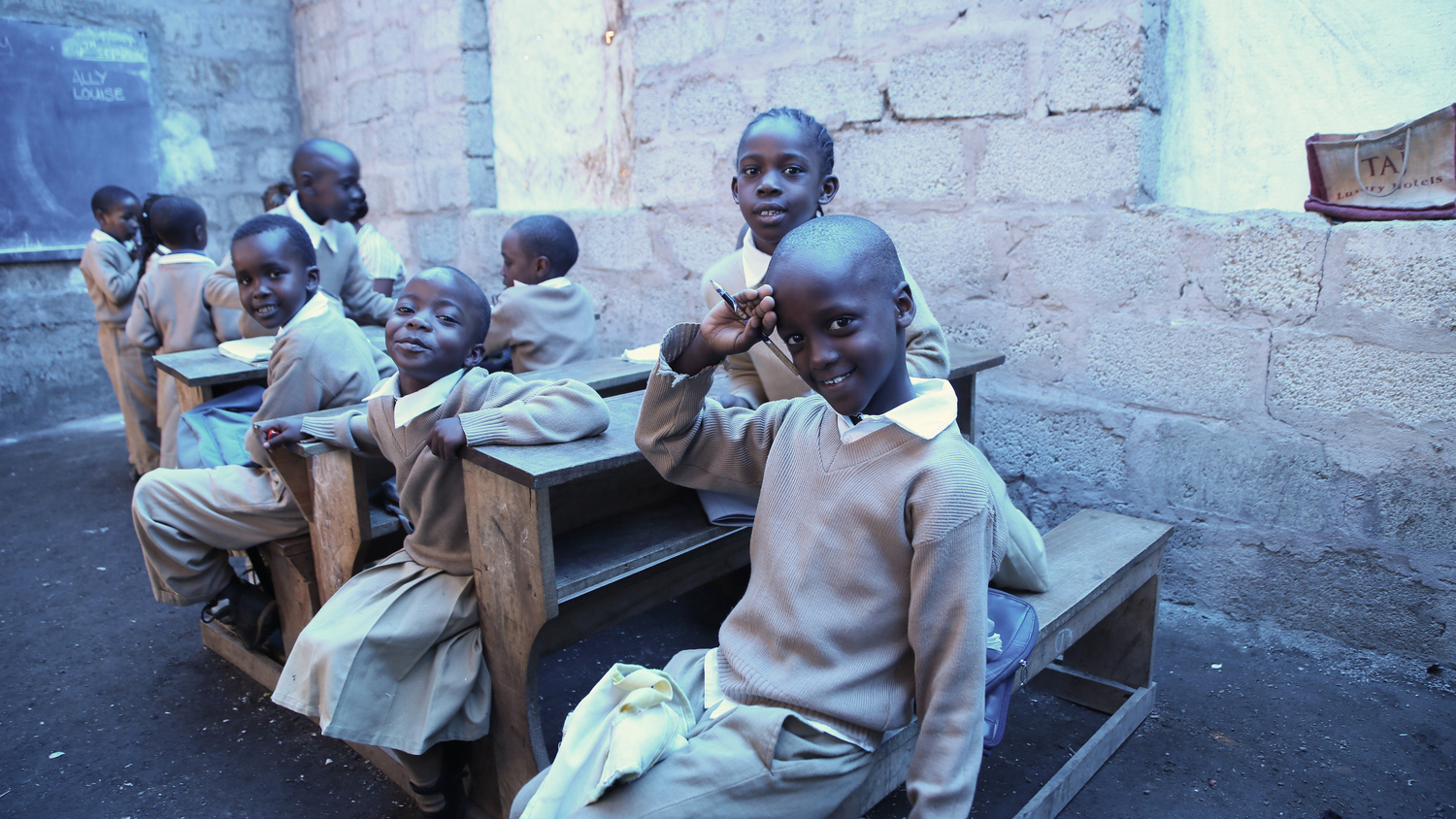
Photo: Primary school students at GloryLand Prep School, an education project in Tanzania
I discovered common threads between all the stories I encountered. Each individual had found hope and the will to rise above the adversities they faced. All of them also had at least one person to believe in and encourage them. Over the past four years, (since I started The Global Sunrise Project) I have learned that making the world a better place is a journey best taken with others. The global citizens I interviewed over the course of my 6 month trip have truly broadened my understanding of resilience, through sharing their own stories of triumph. Having resilience doesn’t mean we don’t feel negative emotions, or the effects of hardship. Being resilient is not the absence of struggle, but about how we respond to adversities in life and use them as an opportunity to grow, learn, and become stronger. Hope is the fuel that drives resilience and gives us the power to face these challenges head on.

Since I’ve returned home, I’m constantly reminded of the simplest things from my journey; whether I’m waking up at dawn, taking a shower, visiting friends, cooking a meal, or taking transportation within my city. The people I met, and the stories they shared, are etched into my heart. When I encounter any challenges now, or feel lost or overwhelmed on my own journey. They are there to remind me of what is possible and I’m re-inspired.
I’ve know people possess more power than they think they have to make the world a better place as I witnessed this firsthand in my travels. I am thrilled to be able to see more shifts taking place and how technology is bringing us closer together to be able to share with each other.
Especially at times like these, it’s easy to feel our actions have no impact. The state of the world is too turbulent and we often let that disempower us. Don’t let it. Now, more than ever, we should let this motivate us to do better, to choose optimism, to be brave, and to take action on the issues we care about. Those who have overcome adversity are powerful and positive everyday role models with great things to teach us all. My hope is that more people will understand anyone, despite their circumstances, can make change. We need to champion each other. One by one, using our own unique talents, for the betterment of our world we will make a collective difference.


